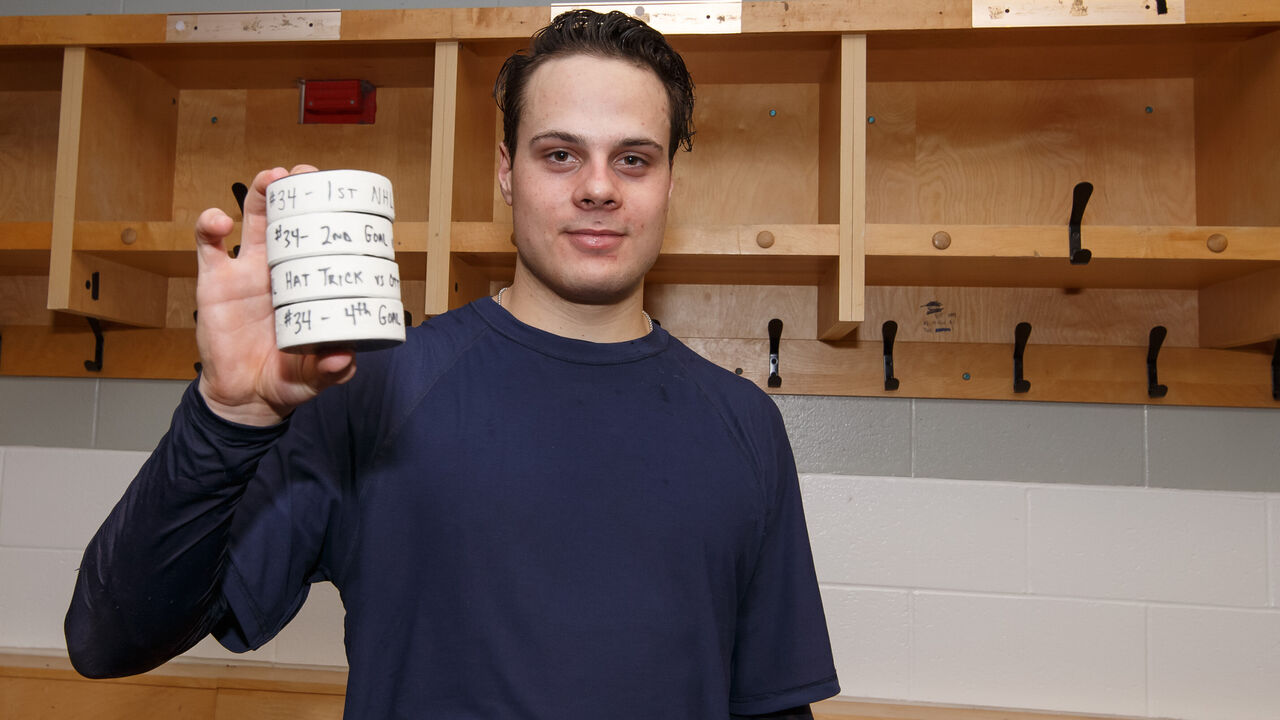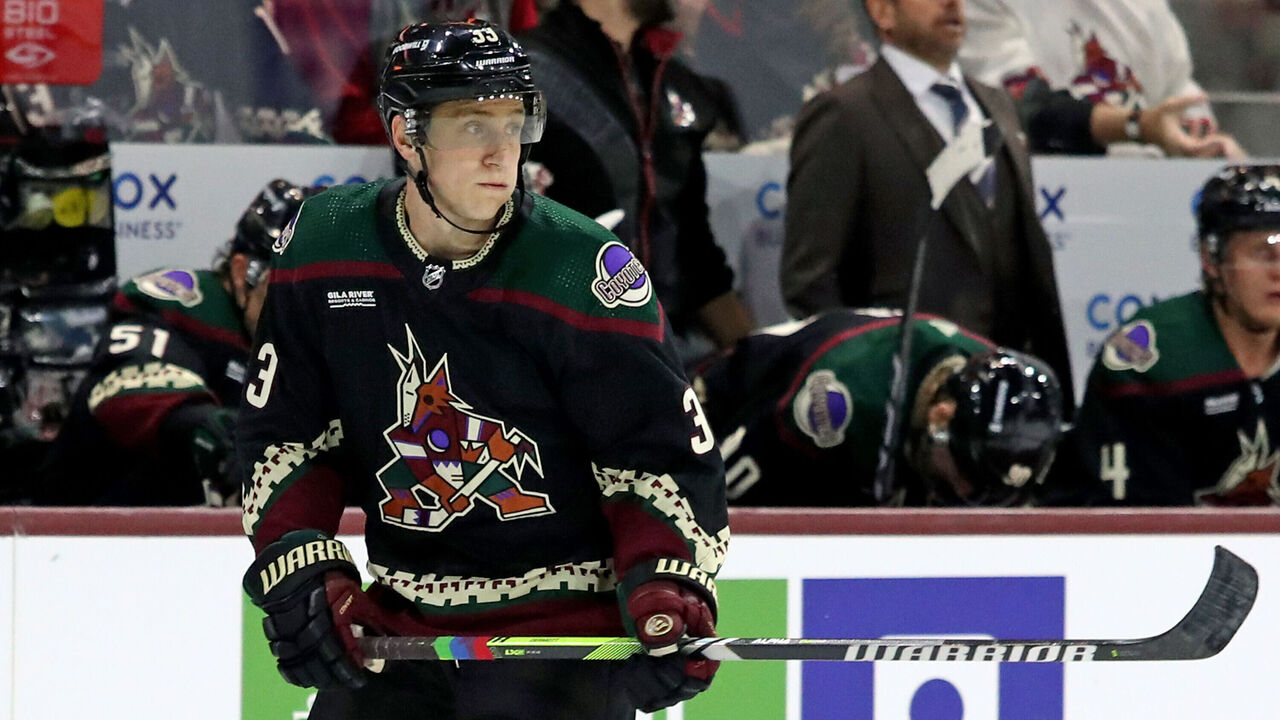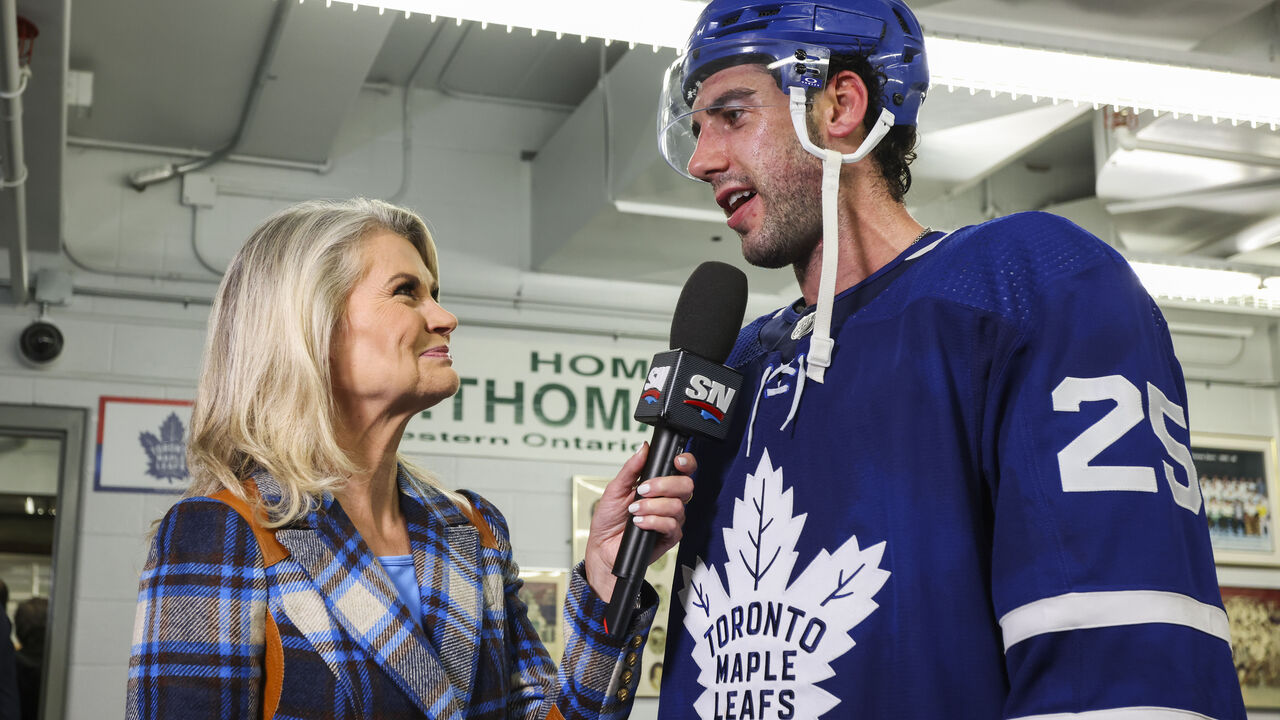Christine Simpson on the storyteller's evolution in the digital age
When Christine Simpson began her career as a hockey reporter in 1998, Google did not exist. Viewers relied on broadcasters and print reporters to uncover information about their favorite players that wasn't accessible anywhere else. Today, information is instantly available and, as a result, the role of storytelling has changed.
But Simpson, who you can catch this season on Sportsnet's Hockey Night in Canada, has changed along with the times, leveraging her vast hockey knowledge and deep contact list to continue to develop feature stories that show a different side of hockey and its biggest stars. As more hockey players get comfortable showing their personality, people like Simpson are there to bring them out of their shell.
theScore recently caught up with Simpson to talk about the changing dynamics of storytelling in hockey and what stories she's paying attention to this year.
This interview has been edited for length and clarity.
theScore: How has the way you tell hockey stories changed from the beginning of your career to now?
Simpson: So much of storytelling comes out of the preparation that you do for the interview. I would say that is one area that has changed so much from when I began. Keep in mind, I started at Sportsnet in 1998. So if I were, for example, heading to California to do a story on one of the Los Angeles Kings, it's not like I could Google the player.
Back then, research started by looking up who is the beat reporter for the L.A. Kings and phoning them. Or, if I knew anyone from that player's past, like a junior coach where they played, a good friend, someone in their world, I would get a hold of that person. That would be kind of the only way that you could do research.
Now, with technology, the players themselves tell you a lot about themselves, especially the younger generation who have social media. One of the first things I would do if I'm interviewing, for example, Trevor Zegras from the Anaheim Ducks, is go to his Instagram and find out, where was he this summer? Did he travel somewhere? Did he go to a teammate's wedding? Does he have a cool hobby that I could ask him about? There are so many other ways to find out about a player. It's been nice to see a lot of players now are a little more open to sharing more of their personality.
How does hockey's culture of conservatism impact your approach to interviews?
Hockey players have always been known as the conservative ones that don't really want to be bigger than the team. I do respect that very much. It's a team sport, but it's nice that a lot of the newer generation can kind of let their hair down a bit and have some fun. Trevor Zegras is a good example of that. They can tell us a lot about themselves through their own channels. It's certainly a helpful tool when I am deciding, "How do I approach this interview and telling the story of this particular player?"
As far as interviews go, it all depends who the leader is. Any team that has, for instance, Lou Lamoriello at the helm - Lou's got his rules, and you will never be able to get around that. I mean, I remember being a rinkside reporter for the Toronto Maple Leafs when Auston Matthews and Mitch Marner were in their rookie seasons. Two of the biggest superstars to come into the game. Lou's rule was, during the game broadcast, I was not allowed to interview rookies. And again, I respect him. Obviously, he's a Hall of Famer. In his mind, they haven't really earned the right yet to have the focus on them. I think he wanted them to just put their head down, do their job, not be distracted.
Well, I'll never forget the very first game of that season: Auston Matthews' debut. They're playing the Ottawa Senators in Ottawa. I'm not allowed to talk to him at the pregame bench warm-up interview, intermission interview. The only caveat was if he does something truly special, then the Leafs' PR would go to Lou and see if he would rescind that rule and allow me to interview him. Well, of course, in Auston Matthews' first NHL game, he scores four goals.
I've got to think that this qualifies as something special. Lou did let me do the postgame interview with Auston Matthews, which I did appreciate.

That might be an extreme example, where leadership just does not want, in any way, shape, or form, anyone to feel bigger than the team. It's all about the culture for hockey players. It's always all about the team. If you're too flashy, you're probably going to have some veteran on the team kind of put you in your place. I guess it's the old-school way of thinking. I do feel that it's changing. But for players, I also think they need to respect what the rules are of their team.
It seems like many athletes today are also concerned about saying something controversial that could become a distraction.
A lot of teams media-train their players. In my experience, that teaches them how to say something without actually saying anything at all, which is why it is so refreshing when a player does open up or even says something controversial, which people can jump on them for. But in my mind, you can't jump on a player. All we want is for them to show more of their personality or to say exactly how they feel.
A huge example is Travis Dermott. Keep in mind, he is not a seasoned veteran with a 10-year deal, he's on a one-year contract. But it was so important to him to use Pride Tape, even knowing he's going against the NHL rules, that he did it. That takes a lot for someone like him to do that, because his convictions were so strong. I have all the respect in the world for him. It forced the NHL to look at their policy and change it. So there's an example of kudos to Travis Dermott of all people, who stood up for what he believed in and felt was right. That's not an easy thing to do.

There's so much information online now - does this change your role as a storyteller? It's hard to bring the viewer something new when they could just Google it themselves. Does that mean you have to ask different questions today than in the past?
I feel like you do need to have a reason for wanting to talk to somebody. You're always trying to find a nugget of something about a great player that people wouldn't have necessarily known, or just get him to open up about something that he hasn't talked about before. Most of my favorite interviews are where we're actually not even talking about hockey. It's more about delving into something about that player - a passion they have, a story about their family, a story about their child, a story about what their goals are beyond hockey, anything like that.
It's also about trying to ask the questions in a way that doesn't allow them to give the cliche answers. And, if they do give the cliche answer, you need to follow up with another way of asking the same question, but wanting to delve a little deeper into it.
It makes you work harder to want to get an interview out of a player, where someone's going to say, "I learned something about them, or even just saw them in a different light."
Is there one career moment that stands out to you when you think about everything you've done?
I have been fortunate enough to be a part of so many Stanley Cup playoff games, All-Star Games, outdoor games, all of that. But, if you force me to pick one, I think I would actually say my biggest highlight was March 8, 2020: International Women's Day. I was part of the first-ever all-female broadcast of an NHL game in Canada. Myself, Cassie Campbell-Pascall, and Leah Hextall. We also had a female producer, director, and most of our truck was female. It was such an amazing feeling to have all of these women who do these jobs all together. I've worked with women over the years, but never kind of all of us coming together at the same time. It was just such an incredible feeling of pride for the industry. When I started in 1998, there was not a chance that any network would even try and do that. They wouldn't have been able to do it because there weren't enough women in those roles who could perform those duties. The fact that we did it, and it was such a huge, huge success, was absolutely one of the career highlights.

Which storylines are you personally most interested in this hockey season?
We all know that a Canadian team has not won the Stanley Cup since the Canadiens did it in 1993. When you saw all the pundits giving their predictions for the season, a lot of them had the Edmonton Oilers potentially playing the Toronto Maple Leafs in the Stanley Cup final. That would be a dream for us in Canada. The Oilers are going to have to get going, but I have every hope that they will.
The other thing I would look to is Connor Bedard. What a phenom. I know the season is young, but he's been living up to all of the expectations and accolades that he got coming into the season. It'll be exciting to see how his rookie season unfolds.
Lastly, for us here in Toronto, we've got the All-Star Game coming to town and that's always a fun event. To have it in our own backyard is something that I am very much looking forward to.
Do you have any cool features in the works that you can give me the inside scoop on?
I was actually just in New York City last week and did two sit-downs that will be coming up. One with Blake Wheeler, who was the captain of the Winnipeg Jets and had a bit of an awkward ending to his career in Winnipeg. He is now with the New York Rangers and will be traveling with the Rangers to Winnipeg on Oct. 30. We talked a lot about how it ended in Winnipeg and how he thinks he'll feel going back there as a member of the Rangers.
The other one I got, and I'm very excited about this one, I sat down with Henrik Lundqvist, who will be inducted into the Hockey Hall of Fame on Nov. 13. I spent a few hours with him in Tribeca, where he co-owns a restaurant. We did the interview at his restaurant and walked the streets of Tribeca. I remember interviewing him in his rookie season back in the day. So, just to have him in a very relaxed state and look back on his career and what some of the highlights were was fun for me.
Jolene Latimer is a writer at theScore.
HEADLINES
- 2026 World Junior Hockey Championship predictions: Podium, MVP, more
- 1 prospect from each NHL team to watch at 2026 world juniors
- McDavid, Draisaitl power surging Oilers past Flames
- Nylander's 4 points lift Maple Leafs over Penguins to snap 3-game skid
- Report: Leafs not contemplating firing Berube, Treliving